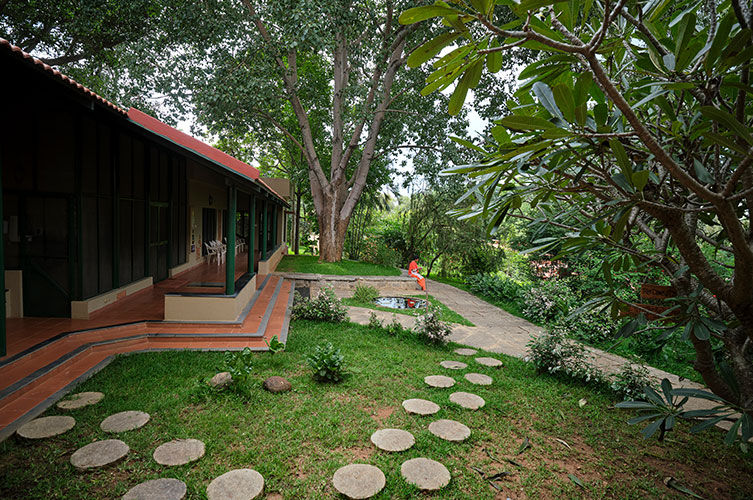
It is not a place for one's own illumination or one's own goal of fulfilment, artistically, religiously; or in any way, but rather for sustaining each other and nourishing each other in flowering in goodness.
Krishnamurti Foundation India
It was in the year 1929 that Krishnamurti spelt out his one point mission––‘to set man unconditionally free’. It was a mission that seemed to fulfill itself wherever he was and wherever he went, its intensity remaining undiminished by time and circumstance and, in fact, gathering new energy and momentum as his age advanced.
Krishnamurti’s growing concern towards the end of his life that people must be ‘soaked in the teachings’ found expression in the statements he made about Study Centres. Dedicating his home ‘Vasanta Vihar’ to posterity before his death, he said: ‘It must last a thousand years, unpolluted, like a river that has the capacity to cleanse itself.'
Located close to the beach where, as a boy, he was discovered and proclaimed the world teacher, this peaceful, tree-filled, six-acre campus has been associated with Krishnamurti’s life and work from the 1930s. It was one of the places in the world where he gave public talks for six decades. It was also the venue of his last talk.
He wanted his home to become a Study Centre and the chief centre for preserving and publishing his works. As headquarters of the Krishnamurti Foundation India, Vasanta Vihar, in the heart of Chennai, is the hub of many activities, which include managing schools and study centres promoting rural education and health, and conserving the environment
What are Study Centres?
The Study Centre is based on the vision of J. Krishnamurti and inspired by the statements he made about his teachings. He wished to bring about Centres where people could go and stay to study the teachings without any organised programmes, and with only their own seriousness to guide them. He said:
'This is a place of learning and austere living with inward discipline, and work, without guru, without leader, and without a system of meditation or working.'
There are many people who, because of distractions of occupations, family, or other factors in their lives, find it difficult to immerse themselves in the teachings. So each one comes to this place on his own, to meditate, to study the teachings, and to do some physical work if he wishes.'
'It must last a thousand years, unpolluted-like a river that has the capacity to cleanse itself-which means no authority whatsoever for the inhabitants. And the teachings in themselves have the authority of the truth.'
'It is essentially a religious centre according to what ‘K’ has said about religion. It is a place where one is not only physically active, sustained and continuous but also there is a movement of learning; and so each one becomes the teacher and the disciple. It is not a place for one's own illumination or one's own goal of fulfilment, artistically, religiously; or in any way, but rather for sustaining each other and nourishing each other in flowering in goodness.'

Krishnamurti Foundation India, which has its headquarters at Vasanta Vihar, Chennai, runs schools and other centres in various parts of the country. The six schools—Rishi Valley School, Rajghat Besant School, The Valley School, The School-KFI, Sahyadri School, and Pathashaala—also have study centres for guests, parents, and teachers to enable them to explore Krishnamurti's teachings. There are study centres in Mumbai, Cuttack, and Kolkatta, which, apart from conducting programmes, also do translation of Krishnamurti's books into Indian languages. Two other retreat centres—in Uttar Kashi and Jalna—enable visitors to spend time quietly in the midst of nature.
Our Study Centres in India
Other Krishnamurti Foundations

The Foundation exists to preserve and make available Krishnamurti’s works. We are a charity based in the UK, providing a worldwide service to those pursuing an understanding of Krishnamurti’s teachings in their own lives.


.jpg)

.jpg)





